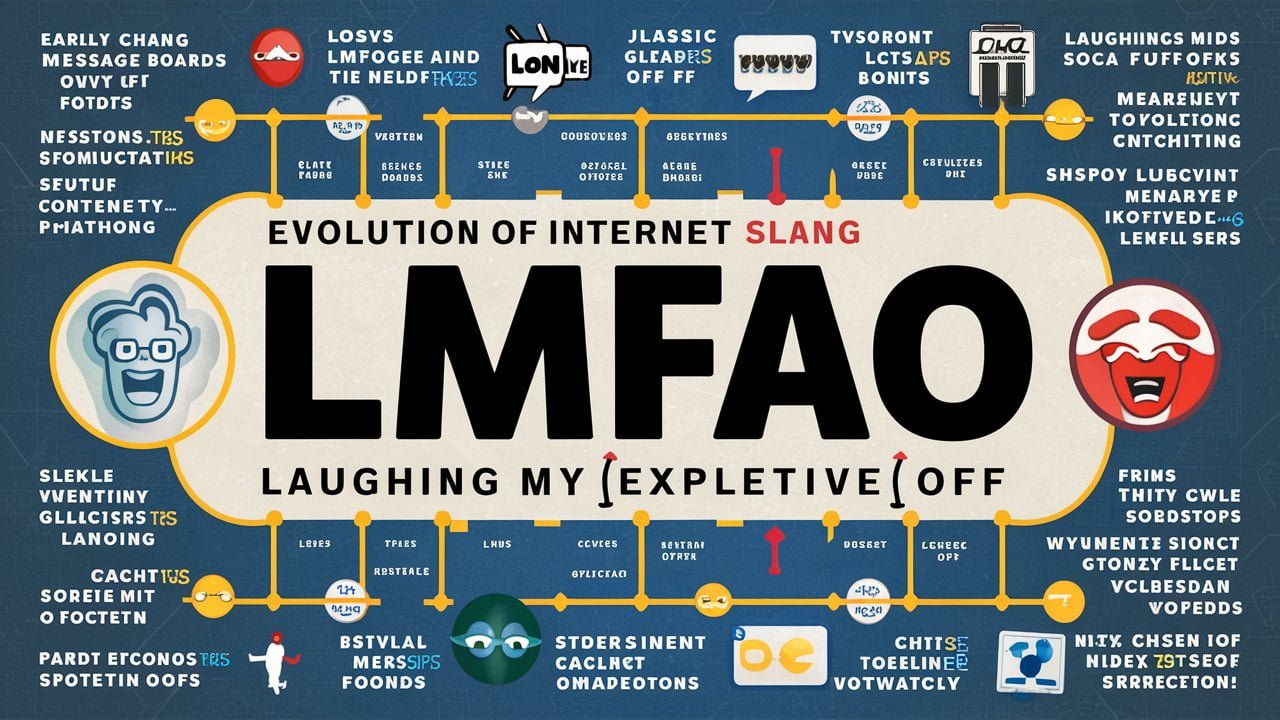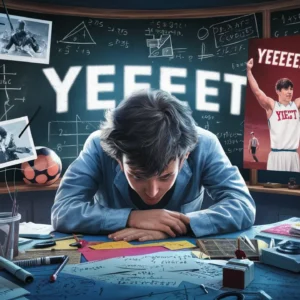In the labyrinthine world of internet culture, where communication is condensed into acronyms and emoticons, a dynamic evolution of language is underway. From the inception of online chatroom to the sprawling expanse of social media platforms, internet slang has woven itself into the very fabric of our digital interactions.
At the forefront of this linguistic transformation stands the enigmatic term “LMFAO.” Its jocular resonance reverberates through memes, GIFs, and casual conversations, becoming a cornerstone in the lexicon of Millennials and Gen Z denizens alike.
As we delve into this linguistic landscape, it becomes evident that LMFAO transcends mere words—it embodies an entire ethos of humor and connectivity in the digital realm. With a brief keystroke, it encapsulates laughter and camaraderie, injecting levity into even the most mundane exchanges.
What sets LMFAO apart is not just its literal meaning but also its contextual nuances; whether as an expression of genuine amusement or a wry response to absurdity, this acronym adapts to various tones and intentions with remarkable fluidity.
Join us on a journey through the corridors of internet slang, as we unravel the layers behind LMFAO’s significance and explore its lasting impact on modern communication practices. Prepare to be amused, intrigued, and perhaps even inspired by the secret language that binds us in laughter across cyberspace.
Understanding Internet Slang
In the digital age, internet slang has evolved into a ubiquitous mode of communication, particularly among Millennials and Gen Z. The use of acronyms and abbreviations like “LOL” (Laugh Out Loud), “ROFL” (Rolling On the Floor Laughing), “BRB” (Be Right Back), and many more have become shorthand ways of expressing emotions, reactions, or actions in online conversations.
These terms not only allow for brevity in messaging but also create a sense of belonging in online communities where understanding this vernacular is akin to being fluent in a shared language.
The proliferation of social media platforms has played a significant role in shaping the development and spread of internet slang. With the rise of platforms like Twitter, Instagram, TikTok, and Snapchat, where character limits or visual content dominate communication, adopting concise internet slang has become essential for effective expression.
The fast-paced nature of these platforms encourages quick wit and immediate responses, making internet slang an efficient tool for engaging with others in real-time conversations.
Common internet slang terms often have interesting origins that reflect the evolving dynamics of online culture. For example, “LOL” dates back to the early days of chatroom and instant messaging as a way to indicate laughter without tone or facial expressions.
Similarly, “ROFL” emphasizes the hilarity of a situation by depicting someone rolling on the floor laughing—an exaggerated gesture that symbolizes intense amusement. Understanding the etymology behind these phrases not only offers insights into their meanings but also underscores how digital interactions have shaped modern linguistic conventions.
Decoding LMFAO
When it comes to decoding the acronym “LMFAO,” it’s essential to delve into its origins and meaning. “LMFAO” stands for “Laughing My Freaking Ass Off,” with variations like the slightly more explicit version substituting ‘freaking’ with a synonymous four-letter word.
The term originated from the broader online slang culture associated with expressing amusement or finding something hilariously funny. Millennials and Gen Z, known for their quick wit and playful interactions on social media platforms, have adopted LMFAO as a go-to acronym to convey laughter in a concise yet impactful manner.
In terms of usage trends, LMFAO has found a comfortable home across various digital communication platforms, especially on informal messaging apps like WhatsApp, Snapchat, and Instagram. Additionally, it frequently appears in comment sections on popular social media sites such as Twitter and TikTok, where users showcase their reactions to comical content through these succinct acronyms.
The informality of LMFAO contributes to its widespread use among internet users seeking lighthearted ways to express amusement in real-time conversations.
One fascinating aspect of LMFAO is how its interpretation can vary significantly based on context and tone within online exchanges. For instance, while traditionally understood as an expression of uncontrollable laughter or finding something extremely funny, the context in which LMFAO is used can alter its perceived meaning.
In certain situations where sarcasm plays a prominent role or when individuals aim to downplay an awkward moment with humor, LMFAO might be employed ironically or sarcastically rather than genuinely laughing out loud, showcasing the nuanced nature of internet slang interpretation.
Impact of LMFAO on Communication
LMFAO, an acronym standing for “Laughing My Freaking Ass Off,” has undeniably left a lasting mark on online communication and the expression of humor. This abbreviation, characterized by its exaggerated and comical nature, has become a staple in digital conversations across various platforms like social media, messaging apps, and forums.
The use of LMFAO not only signifies genuine amusement but also adds an element of lightheartedness to interactions, making it a go-to choice for many individuals looking to infuse their messages with humor.
The widespread popularity of acronyms like LMFAO can be attributed to their ability to encapsulate complex emotions or reactions into short and easily digestible phrases. In the fast-paced realm of online communication, where brevity is key, these concise expressions allow users to convey sentiments quickly and efficiently.
Additionally, the entertainment value associated with terms like LMFAO contributes to their staying power in internet culture. While some acronyms may fade away as trends shift, those that successfully evoke laughter or resonate with a wide audience tend to endure over time.
Incorporating memes, GIFs, and other visual elements into discussions featuring LMFAO further enhances the impact of this internet slang term on communication. These multimedia additions serve as complementary tools that amplify the comedic effect of using LMFAO in online exchanges.
For instance, pairing an animated GIF of a laughing baby with an LMFAO caption can intensify the humorous tone of the message while engaging recipients visually. By integrating such visual aids alongside internet slang like LMFAO, individuals are able to craft more entertaining and memorable interactions in digital spaces.
The future of internet slang.
The future of internet slang is a dynamic landscape that continues to evolve alongside the changing preferences and behaviors of younger generations. As Millennials and Gen Z continue to dominate the online sphere, we can anticipate a further diversification and proliferation of new internet slang terms.
This evolution is likely to be heavily influenced by pop culture references, with phrases or expressions from music, movies, TV shows, and online influencers seamlessly integrating into everyday digital communication. For example, terms like “stan” (meaning an avid fan) originated from Eminem’s song “Stan” but have now become widely used across various social media platforms.
Moreover, the rise of digital communication platforms has democratized language in unprecedented ways. With emojis, GIFs, memes, and short-form videos being integral parts of online conversations, there may be potential changes in language norms as visual elements increasingly complement text-based communication.
For instance, TikTok trends not only generate viral dances but also introduce new catchphrases and internet lingo that quickly seep into mainstream usage. This confluence of visual media with written language could reshape how we perceive and communicate through internet slang in the coming years.
As digital natives continue to innovate and adapt language for their online interactions, we can expect a fusion of traditional linguistic principles with modern internet culture. The boundaries between formal writing and informal internet discourse might blur further as people embrace brevity, creativity, and humor in their online dialogues.
Additionally, the sheer speed at which new terms emerge and spread within online communities suggests that future internet slang could become even more fleeting yet impactful — reflecting our fast-paced digital world where trends come and go in the blink of an eye.
By staying attuned to these shifts in language use and cultural references, individuals can actively participate in shaping the lexicon of tomorrow’s internet slang landscape.
The Lasting Impact of LMFAO
In conclusion, the acronym LMFAO has left a significant mark on modern communication practices. It serves as a testament to the ever-evolving nature of internet slang and its enduring presence in online conversations. The popularity and widespread use of LMFAO highlight how internet culture continues to shape how we express humor, emotions, and reactions in the digital age.
As we navigate the dynamic landscape of internet slang, it is essential for readers to remain engaged with evolving trends. By staying connected to the latest acronyms, memes, and expressions, individuals can cultivate a deeper sense of belonging within online communities.
Embracing these linguistic shifts not only enhances one’s ability to connect with others but also fosters a shared understanding of the vibrant language that defines contemporary digital interactions. So keep exploring, learning, and laughing – because in the realm of internet slang, there’s always something new to discover!



